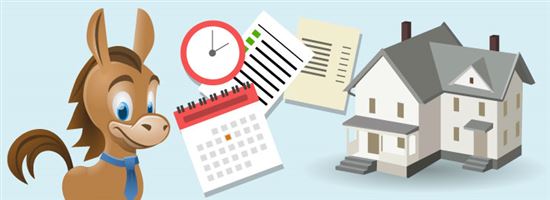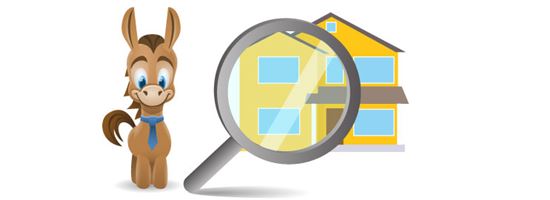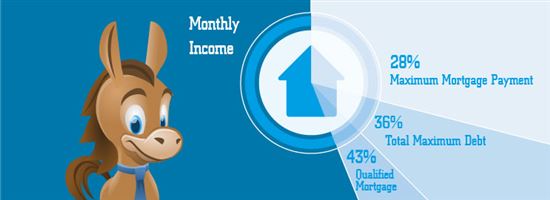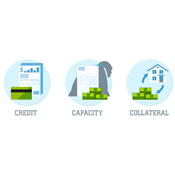How to Buy Your First Home
Thinking of buying your first home? Read this step-by-step guide to learn how to prepare AND avoid the common mistakes first time homebuyers make.
 |
| © CreditDonkey |
Forget a new car or an engagement ring, a home is the biggest purchase that most of us will ever make.
Your home is likely (but not certain) to appreciate in value over time, which helps you build equity (more on that later).
In this article, we will discuss 9 steps to buying your first home:
- Prepare to Buy a House
- Get Pre-Qualified
- Choose a Realtor
- Find a Lender
- Get Pre Approval
- Shop for a House
- Place the Offer
- Apply for a Mortgage
- Close the Home Loan
Read on to see if you're ready to buy your first home. Then learn the important steps necessary for loan approval.
- Save for a down payment
- Improve your credit score
- Get pre-qualified online
- Find a realtor
- Find a home you love - and can afford
Preparing to Buy a Home
 |
| © CreditDonkey |
Securing a mortgage is a serious commitment so make sure you're ready BEFORE you begin. Start by answering these questions:
- Do you have enough money saved?
Knowing how much money you need is important.Remember: there's more than just the down payment. You need money for closing costs, moving costs, and emergency funds, too.
Ideally, you'll make a 20% down payment. On a $150,000 home, this means $30,000. Add between 2% and 5% to this number for closing costs.
Did you know: You can buy a house for as little as 3% down payment? Read about low down payment mortgage loans.Related: How to Save for a House
- Can you afford the monthly payments?
![© CreditDonkey]()
© CreditDonkey Owning a home involves more costs than renting.
You'll have to pay:
- Utilities every month
- Property taxes
- Home insurance
and, of course, your mortgage. If you can't afford 20% down, private mortgage insurance will become part of your monthly obligations as well.
Tip: Have you thought about the pros and cons of renting vs. buying? You may find you're better off renting believe it or not - some smart renters are able to have more net worth than homebuyers, and in some regions, renting is actually cheaper in the long run. - Utilities every month
- Is your credit high enough?
Your credit score tells the story of your financial past. The lender will look at your score and credit history. Together, this helps them determine your financial responsibility.- Do you pay your bills on time?
- Do you overextend your credit?
- Do you have a lot of debt?
We recommend obtaining a copy of your credit report before you apply for a mortgage. Look at your history and the validity of each account.
Contact the credit bureau if there are errors and pay down any high balances to improve your score.
Tip: Lenders prefer high credit scores. The best interest rates are usually reserved for those with a score of 740 or higher.A credit score of 680 or higher will usually get you the stamp of approval. And 620-680 is considered fair but you may not get the best terms available. It's wise to know your credit score is before you apply. Check out our tips to help improve your score.
- Do you pay your bills on time?
- Is your employment and income stable?
Lenders do not want to see rocky employment history or wavering income.Consider the past few years of your life:
- How many jobs have you held?
- Were they in the same industry?
- Did your income remain stable, increase, or decrease?
The more stable your income and employment, the more likely you are to obtain a loan approval. Changing jobs is not necessarily a bad thing, though. If you stay in the same industry but advance your career, it can actually help.
- How many jobs have you held?
- Are your debts under control?
Your debt-to-income ratio plays a role in your loan eligibility as well. Too many debts with too little income will result in a denial.Lenders will look at the debts indicated on your credit report. Payments like auto loans, student loans, and credit card debts, plus your proposed mortgage payment, make up your monthly debts.
Divide this total by your gross monthly income to learn your debt ratio. Most loan programs require a total debt ratio lower than 36%.
Tip: A personal loan from a trusted friend, relative, or parent, can often help a new home buyer keep from wiping out their savings and assets. Such a loan can increase your down payment, and become eligible for more favorable mortgage terms.Make certain that you understand the terms of the personal loan, the repayment schedule, and how it fits into your overall monthly payment.
It's not a good idea to apply for additional loans or credit once you have made an application for a mortgage. Personal loans should be planned for prior to proceeding with any mortgage application.
Answering these questions will help determine if you are ready to purchase your first home. More details are available in our article "How to Get Approved for a Mortgage."
Keep reading for important steps—and mistakes to avoid—when shopping for your first home.
Keys to Buying Your First Home
 |
| © CreditDonkey |
Think You're Ready? Get Pre-Qualified
Once you've check all the boxes above, find out what a bank thinks of your chances of getting a mortgage. You can get a pre-qualification online or over the phone.
The process is short and informal process. Best of all, you don't have to use the same bank when you find a home. This is just to give you an idea of what you can afford.
Generally, you'll make a down payment (which can range from 3% to 20%) and finance the rest remainder through a mortgage. Getting pre-qualified is a great way to determine if you're financially ready to buy.
You'll need to disclose your income, assets, estimated credit score, and estimated debts. The lender will then provide you with an estimate of how big a loan you might receive.
Keep in mind that an approval isn't guaranteed until you provide the lender with proof supporting your estimates. But the pre-qualified loan amount can help you set limits when you start looking for your future home.
Decide if you Want to Use a Realtor
 |
| © CreditDonkey |
Now that you have an idea of what you can afford, you're that much closer to actual house hunting. But first, you should decide if you want to use a realtor. Here are some important points to consider.
- For the buyer, a realtor's services are "free," meaning you don't pay the realtor outright. The seller pays the realtor out of the proceeds of the sale. But that means the cost of the realtor will often be built into the asking price of your home. In other words, that's how they get ya.
- A realtor can be a valuable tool. The right one can help you find homes within your budget and requirements that you might miss on your own.
Realtors may even have access to listings BEFORE the general public, so you can beat other house hunters to great finds. This can free you up for other tasks. Like…
- Securing a mortgage. This process can be complicated and time-consuming. And you'll have to handle it on your own so the more time you have to focus on it, the better.
- Realtors present offers in written contract form, and take many steps on your behalf to ensure that the contract remains solid.
Find a Lender
Finding a lender early in the home-buying process really helps move things along. To get started, you'll need to be pre-approved.
This is separate from your pre-qualification, which simply helps you evaluate your chances of securing a mortgage.
- First, you need a lender. You might decide to stick with the lender that provided the pre-qualification, but it's smart to shop around a bit.
A good rule of thumb is to obtain quotes from at least three lenders. You can start with your current bank or credit union then check online for other lenders and brokers in your area.
- Compare interest rates, closing costs, and terms to give you a better overall idea of what is available to you. Each factor affects the outcome of your loan so don't focus on the interest rate alone.
- Once you choose a lender, you will need pre-approval. We show you how to secure this below.
Time for a Preapproval
 |
| © CreditDonkey |
A pre-approval tells you what you can afford and what kind of payment you can expect. Without a pre-approval, some sellers will not take your bid seriously.
They want bidders who have proven they can secure financing. A pre-approval shows sellers you are serious AND qualified.
The US Department of Agriculture also offers zero down payment loans for those meeting certain income and geographical requirements. You will pay a regular "guarantee fee," however.
Some bank program also programs with no down payment as well. Do your homework to find the best option for you.
The lender will need the following documents to determine your loan eligibility:
- Income documents: You'll need to provide your two most recent paystubs, as well as W-2s and/or tax returns from the last two years. Lenders use this information to determine your income pattern and employment stability over time.
- Asset statements: The lender needs to verify that you have sufficient funds for the down payment. They will make sure the funds are yours by requesting a paper trail over the last 12 months.
- Credit report: You must provide your personal information, including your social security number. This allows the lender to pull your credit report.
During the pre-approval process, the lender may provide you with several loan options. A few terms you may hear include:
- 15, 20, or 30-year terms - This describes how long you have to pay the loan back. The shorter the term, the higher the payment. You may benefit from paying less interest, though, if you make your payments on time.
Remember: the longer you borrow money, the more interest you pay.
Tip: A 30-year loan is the most popular option among home-buyers. - Conventional, FHA, USDA, or VA - These are the mortgage types available. Conventional loans are the most common, but not the only option available.
FHA loans often have more flexible guidelines for borrowers with mediocre credit scores.
VA loans are for veterans who served in the armed services. They don't require a down payment and also have flexible terms.
- Points - Points are fees you may pay at the closing. Every lender charges a different amount. 1 point equals 1% of your loan amount. If you borrow $100,000, 1 point equals $1,000.
You may also hear the terms discount points and origination points.
- Discount points are paid in exchange for a lower interest rate.
- Origination points are fees charged by certain lenders to process your loan. They have nothing to do with the interest rate.
Each of these pertains to specific loan programs. Every lender has different programs available, just as every borrower qualifies for different programs.
Within three business days of receiving your application, a lender will send you a loan estimate. This details the full estimated cost of your loan, including:
- Monthly payment
- Interest rate
- Balloon payment if any
- Total closing costs
The loan estimate also outlines any negative amortization and prepayment penalties. All lenders use the same standard loan estimate form.
Remember: a pre-approval does not bind you to any particular lender. It's smart to shop around and see where you find the best rates and conditions.
Learn more about the pre-approval process in our article "Mortgage Approval: What You Need to Know."
Time to Shop for a Home
 |
Now that you've done the hard work, you can finally start shopping for a home…which can also be hard work.
But with the proper preparation completed, you'll be able to stay focused and within your budget.
Your lender will have provided you with a letter detailing the maximum amount you can borrow, the terms and the program you qualify for. program.
For example, if you are pre-approved for a $200,000 loan with FHA financing for 30 years, that's exactly what the letter will state.
Some sellers allow government-backed financing, such as FHA or VA loans, while others prefer to avoid them. You should just be upfront about your loan right to help prevent issues arising further down the road.
The amount on the pre-approval letter does NOT dictate your purchase price - that varies depending on how much you can put down.
Add the amount you will use for the down payment to the pre-approval loan amount to come up with the maximum you can bid on a house. (To be clear, you don't necessarily want to pay the maximum. The amount you can afford depends on you and the price you believe is fair for a particular house.)
When you consider how much you will offer on a house, remember to factor in your closing and moving costs as well. You don't want to spend all of your savings on the down payment just to buy a more expensive home.
Typically closing costs are between 2 and 5 percent of the purchase price of the home. If you buy a $150,000 home, that means you may pay between $3,000 and $7,500 in closing costs.
You may be able to roll those costs into the loan amount, depending on your lender and the type of loan.
In calculating your monthly expenses, be sure to include estimated utilities and HOA costs, too.
Your pre-approval should state the down payment percentage the lender approved. For example, if you qualified for FHA financing, you need a minimum down payment of 3.5%.
If you qualify for conventional financing, you will be expected to put down more (if it's less than 20%, you'll also need to pay private mortgage insurance or PMI). This affects your monthly payment and debt ratio, so proceed carefully.
If your credit score falls between 500-579, you may qualify, but with a 10% down payment. All FHA loans charge annual mortgage insurance no matter how much you borrow. This insurance lasts for the term of the loan.
Conventional loans allow down payments as low as 5% for borrowers with good credit. Any down payment less than 20% requires PMI. The difference here is you can get rid of it once you owe less than 80% of the value of your home.
Using your pre-approval as a guide, you and your realtor can shop within your budget to help you find a home.
You can use several methods:
- Browse real estate websites offering MLS listings and For Sale by Owner properties
- Work with a realtor who can alert you of listings within your budget and desired area
- Attend open houses to get a feel for the type of houses that are available in your price range
It's wise to make a list BEFORE you start looking. Separate important home features into "must have's" and just "nice to have's". You should also decide which factors are absolute deal breakers.
Keeping this list in mind (or even in hand) will help you remain objective. Remember: it's easy to get caught up in the emotion of buying a house. But that emotion can make overlook a problem that you'd otherwise consider a deal breaker.
Placing An Offer
 |
| © CreditDonkey |
Once you find a home you love, it's time to place an offer. We suggest using a realtor and/or attorney for this step.
You'll need to have the offer written up in contract form. Realtors do this for you as part of their service.
A basic purchase contract will include the following:
- Property information including the address and legal description
- Agreed upon purchase price
- Agreed upon down payment and/or earnest money
- Agreed upon closing date
- Description of items staying in the home
- Necessary disclosures pertaining to lead paint
- Warranty information
Earnest money can vary from a flat amount to 1 percent of the purchase price. It is paid to the realtor prior to presenting the written offer and is included in that offer. Earnest money must be deposited in an escrow account within three days.
In some states, the remaining down payment is held in an escrow fund by an attorney who serves as the closing agent. With any escrow account, a check must be deposited within three days of being presented.
You may also want to include appropriate contingencies in your contract. A few of the most common contingencies for first-time homebuyers include:
- Inspection contingency: This gives you time to pay for an inspection of the property. A home inspection is performed by a licensed home inspector and is usually paid for by the buyer.
Tip: You should also consider if you need a termite inspection along with a general inspection. Including these contingencies in your contract protects your interests.
Home inspections can give you more detailed information about the condition of the property and systems. Once informed of any issues, you can determine if you still want to purchase the home.
If not, you can typically back up WITHOUT losing money (assuming it's before the expiration of the contingency.)
Some attorneys also view the home inspection contingency as an opportunity to negotiate more givebacks from the seller.
Home inspections offer an objective idea of costly repairs which the seller may need to make. In general, you'll want to keep the deal on track unless the house is an absolute disaster.
- Financing contingency: This gives you a specific amount of time to secure your loan. Even if you have a pre-approval, you still need an approval without conditions.
An underwriter needs to evaluate your documents to make sure everything meets the program's requirements. If your financing falls through before the expiration date, you can back out of the purchase without penalty.
- Appraisal contingency: You have no control over the value of the property. You also do not have control over the amount the seller asks for the home.
An appraisal contingency gives you a way out. If the value does not meet or exceed the agreed upon sales price, you do not have to purchase the home.
Once the seller accepts your offer along with your contingencies, all parties sign the sales contract.
Keep scrolling to learn what happens after the sale is made.
Processing the Loan
 |
| © CreditDonkey |
With a signed purchase contract and all necessary documents with the lender, the waiting begins.
If you have a pre-approval, your wait may be slightly shorter. The lender will go over your income documents again and might even re-verify your employment or income. Proof of income includes:
- Pay stubs
- W2's
- Tax returns
- Bank statements
and further documentation of your employment as needed..
The real waiting pertains to the appraisal and title search. The underwriter needs both documents to proceed, as well as the home inspection report and the documentation from the appraiser.
- Appraisal: This report shows the value and condition of the home. FHA loans require certain standards to be met to ensure the home is safe and sanitary.
Without the right appraisal, the underwriter can't clear your loan to close no matter how qualified you are for the loan.
- Title search: This is an examination of the prior ownerships of the property. The examiner also looks for other liens on the property.
All liens must be cleared before you can close on the loan. Unpaid tax liens or unpaid contractors are common reasons for liens on a home.
Once the underwriter approves the appraisal and clear title you are well on your way to the closing table.
Closing the Loan
 |
| © CreditDonkey |
Closing the loan and taking possession of the home occurs after underwriting. When the underwriter clears everything, you'll receive a "clear to close" notice.
This means the closing agent, lender, and seller can arrange a closing date. At the closing, you sign the necessary documents that make you a first-time homebuyer with your first mortgage.
You can expect to see your loan officer, the seller, your attorney, and real estate agent at the closing table. They all sit alongside the closing agent.
The agent runs the show while the others provide support as needed. The closing agent can be an attorney, or a title representative depending on the location and custom.
You'll need to bring certain items to the closing:
- "Proof of paid homeowner's insurance for the next 12 months.
- Photo ID - At the closing table, you will need to provide proof of identity, such as a photo drivers license or military ID, green card, or passport and passport ID card.
- Cashier's check for the amount of your down payment and any closing costs.
Closing costs generally range from 2 to 5 percent of the loan in some areas and include the following:
- loan origination fees (typically one percent of the mortgage, may vary)
- discount points
- appraisal fees
- title searches
- title insurance
- surveys
- taxes
- deed-recording fees
- credit report fee
- Property taxes and homeowner's insurance
These costs are disclosed with a good faith estimate within three days of an application for a home loan.
Lenders may require funds to be held in reserve to ensure that taxes can be paid. These are calculated based on when the taxes are due and when the mortgage term begins.
You should receive a closing statement at least three days before your closing date. This will tell you how much money you must bring to the closing. It also gives you a chance to go over the loan details to make sure they are what you agreed to at the start of the process.
You may choose to refinance your mortgage in a few years. This is a good idea if the interest rate drops, or if you have an opportunity to qualify for a loan program with fewer fees and lower overall cost.
Refinancing comes with costs, as does obtaining a first mortgage when you buy a house. There are application fees, and closing costs which include inspections, title searches and surveys.
As a homeowner, you'll steadily build equity. Keep scrolling to see how that process works.
What is Equity?
In simplest terms, equity is the amount of your home that you actually own.
Every month, you'll pay down the interest and principal balance on your mortgage. The total amount of principal you have paid, added to your down payment equals the equity in your home.
Imagine you purchase a home for $250,000. Between your down payment and the principal on your mortgage, you've paid $25,000 within the first five years. That means you own 10% of your home's value. But the keyword is VALUE, which isn't the same thing as the price you paid.
The value of your home increases—and sometimes decreases—over time. When you're ready to sell or refinance, you'll need to appraise the market value of your home. If the value has increased or decreased, so has your equity.
For example, if the home you purchased for $250,000 has DOUBLED in value, that 10% equity is now worth $50,000. (Important note: Do NOT expect your home to double in value in five years.)
Bottom Line
Buying your first home is equal parts exciting and overwhelming. You can make it easier on yourself by honestly assessing your readiness.
Once you know it's the right time to buy, follow these simple steps to make the process as smooth and worry-free as possible.
Write to Kim P at feedback@creditdonkey.com. Follow us on Twitter and Facebook for our latest posts.
Note: This website is made possible through financial relationships with some of the products and services mentioned on this site. We may receive compensation if you shop through links in our content. You do not have to use our links, but you help support CreditDonkey if you do.
Read Next:










